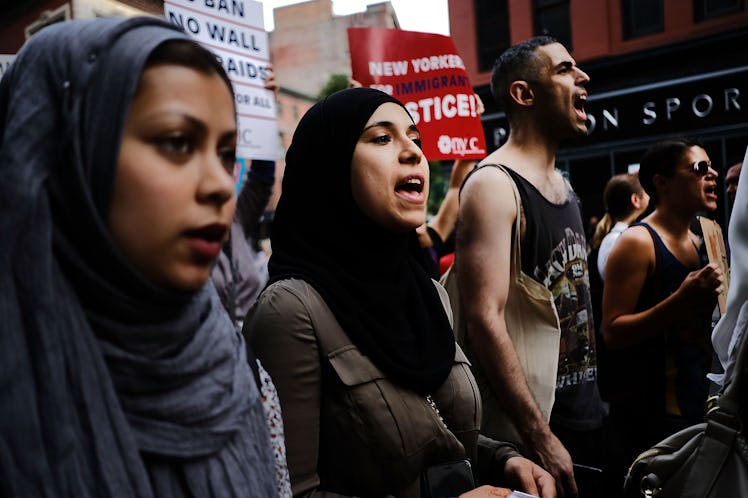
Trump's Travel Ban Might Be In Serious Legal Trouble & Here's Why
One of President Donald Trump's most controversial moves as president is about to get put in the hot seat once more. On Friday, Jan. 19, it was announced that the Supreme Court is hearing Trump's travel ban challenge this spring. Arguments are slated to be heard this spring with a decision expected by June, according to The New York Times.
The nation's highest court agreed to hear a challenge to the third version of an executive order Trump issued last year. Trump's travel ban, barring visits to the U.S. from nationals of a handful of Muslim-majority countries, has been a roller coaster ride.
The first version of this ban was signed just after taking office, and was swiftly struck down by courts nationwide. A second version introduced in March banned travelers for 90 days, and refugees for 120 days, but was similarly challenged and appealed by the Trump administration. The Supreme Court allowed the ban to go into partial effect beginning in June while it heard the case, but eventually dismissed the case after the expiration date in October. But by then, Trump had already issued a third version. His September iteration is now at issue, and it's unclear whether it will face a similar fate as its predecessor.
This third version of the ban affects most travelers from Chad, Libya, Somalia, Yemen, Iran, North Korea, and Syria, plus some categories from Venezuela. Unlike the previous version, this ban has no expiration date. The 9th Circuit Court of Appeals ruled last month that this latest ban was in violation of federal immigration law and went beyond the scope of the president's authority.
On Dec. 4, the Supreme Court allowed this ban to go into effect while lower courts heard cases, essentially going back on a compromise made earlier that year to allow those with "bona fide" connections in the U.S. to resume travel. The challenge to Trump's travel ban is being carried out by several individuals, as well as a Muslim group and the state of Hawaii. Now, the Supreme Court will weigh in for the first time on what the president's authority is to make immigration decisions regarding national security.
In a statement released Friday, Hawaii Attorney General Doug Chin said, "We have always known this case would ultimately be decided by the United States Supreme Court. This will be an important day for justice and the rule of law. We look forward to the Court hearing the case."
Neal Katyal, one of the lawyers leading the case against the travel ban, tweeted the news on Friday afternoon. "The Supreme Court has just agreed to hear #HawaiivsTrump, our challenge to Trump's travel ban," he wrote. "We look forward to the Court's review of this important case. @realdonaldtrump, see you in Court."
Solicitor General Noel J. Francisco, on behalf of the Trump administration, is confident this ban will be upheld by the Supreme Court on the grounds of protecting national security. "Based on the findings of the review process, these countries do not share adequate information with the United States to assess the risks their nationals pose, or they present other heightened risk factors," he wrote in his petition to the court. "Whereas prior orders of the president were designed to facilitate the review, the [current] proclamation directly responds to the completed review and its specific findings of deficiencies in particular countries."
But a review is most likely not all the court will be considering when they hear arguments this spring.
Trump's recent alleged "sh*thole countries" comments may have bearing on the case, too. One legal scholar interview by ABC said Trump's alleged remark "makes it more reasonable for courts to decide that the travel ban can be struck down as unlawful." In a Jan. 12 tweet, Katyal jokingly thanked Trump for making the statement, insinuating that his words were providing fodder for his argument of discrimination by the president. Other experts debated if the latest comment would sway the courts one way or another in showing a pattern of bias.
The news comes just one day before the first anniversary of Trump's inauguration in office, and just a week shy of one year since his first travel ban was unveiled last January.